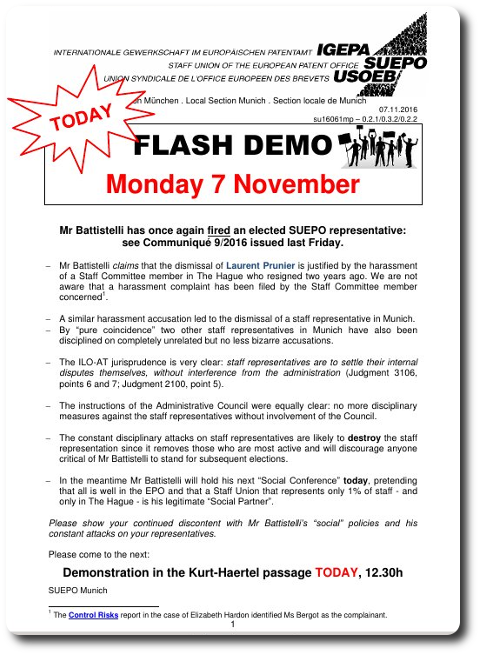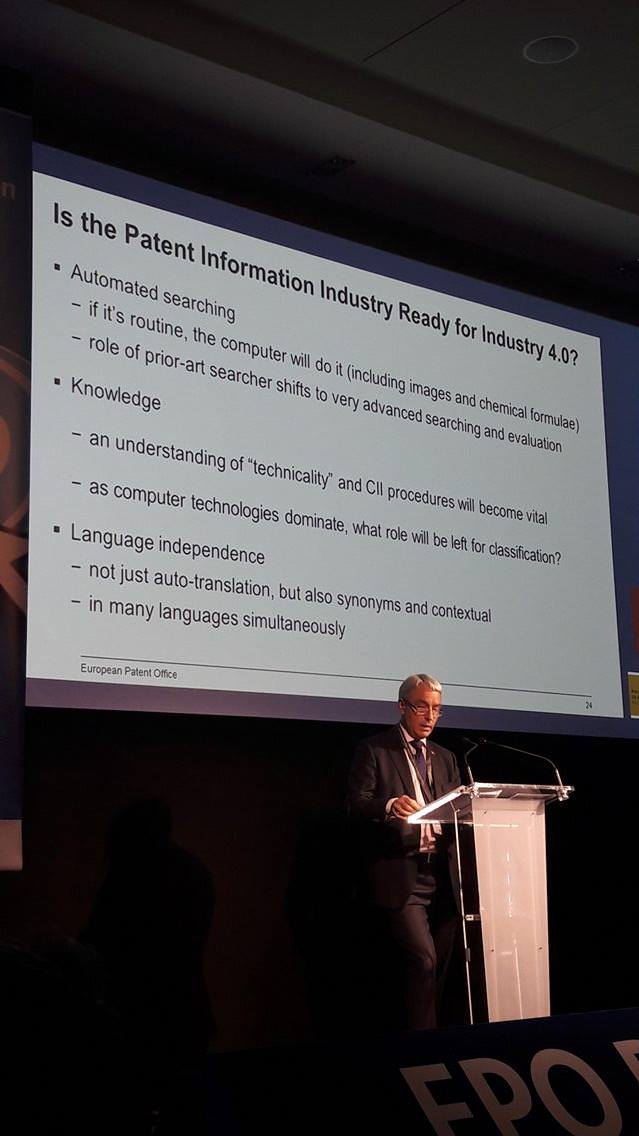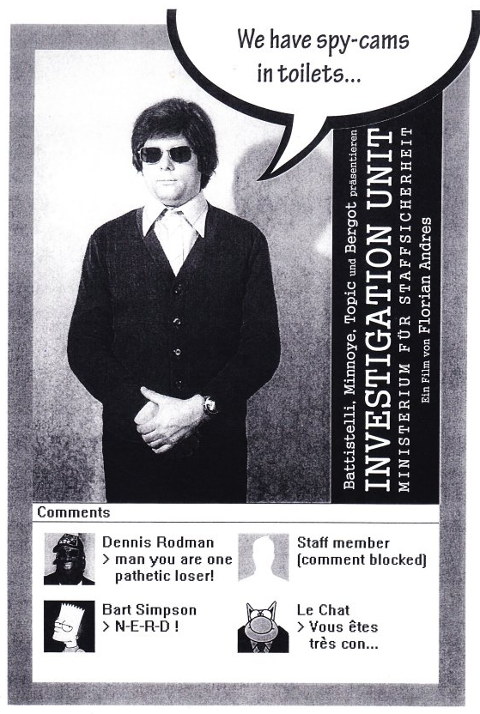11.08.16
EPO Social Workshops on Monday and Tuesday? No, EPO Staff up in Arms!
Benoît Battistelli keeps digging his own grave

Summary: A large bundle of information about the latest horrible actions from Benoît the Terrible, who decided to bust unions also at The Hague, not just in Munich where he resides
TODAY, THE EPO is throwing another stupid and distracting party (an event called Patent Information Conference 2016) and after the social conference from an antisocial boss we expect to see social “workshops”, ones that are supposed to have taken place today and yesterday. But don’t expect staff to have attended or for anyone to genuinely care for this. Staff of the EPO was up in arms after it learned that on Friday the boss had fire yet another staff representative, as first covered in our site with this leak.
Today we heard of yet more “erratic behaviour” from Battistelli, but we shall leave that aside as a subject for another day.
Looking at some correspondence that got leaked to us, “Laurent Prunier is FIRED with immediate effect – no game changer” was the initial word, preceding if not almost coinciding with Battistelli’s announcement. “It has been reported that the EPO president has taken a final decision regarding our suspended Colleague in The Hague,” said one person. “After Els Hardon and Ion Brumme earlier this year it is now the turn of Laurent Prunier, elected Central Staff Committee and SUEPO official, to be fired with immediate effect!”
“One thing can be concluded,” said this message. “Fact is that the clear warnings given by the AC delegates in the last AC (see previous mail below) has had little influence on the President of the Office.”
Well, he certainly doesn’t seem to care.
“Under these conditions, despite many declarations of intent,” continued the message, “it is hard to believe that there is any significant paradigm change in the present management policy. And It bodes bad news for the further two further investigations and disciplinary cases running presently on The Hague Union officials… for the record, there have been also four further downgrades and several additional suspensions not listed over the past two years.”
We happen to be aware of some of them. Things are even worse than it appears to outsiders because de facto gag orders or scare tactics (or even blackmail) are being used to discourage or suppress facts. It’s like those fictional novels that are cautionary tales about totalitarian regimes. Apparently, some say, Mr. Prunier risks losing even his pension if he speaks out too much. What on Earth is this, an authoritarian failed state? At the very heart of Bavaria or in The Hague? How can it be and one can that persist?
At The Hague, told us one source “The Office does not allow demonstrations on the premises, and in the Netherlands public demonstrations cannot be organised spontaneously (the preparation takes about a week, at least). That’s why some staff members organised a spontaneous gathering to protest against the unfair dismissal of Laurent: 250 to 300 persons wearing solidarity T-Shirts spontaneously gathered on Monday morning in the canteen of the EPO’s The Hague branch. Sad and angry, they expressed their disagreement with the emperor’s bullying against their staff reps and the firing of Laurent.”
The protest photos from Monday was posted here yesterday (hours after they had been taken) and these help spread the message to more sites. “Even IAM could finally see the light,” one EPO insider wrote, after IAM said Battistelli had scored an "own goal".
Is IAM finally ‘defecting’? Does it realise that in order to save the EPO change in management is urgently needed?
IAM’s Editor in Chief (Joff) later published in the blog “EPO users and staff need the Administrative Council to get a grip on current events,” albeit he maintained caution, probably because he needs not to get into a fight with his buddies/parters at the EPO. Battistelli does not tolerate any dissent, or even a minor disagreement. To quote a portion:
What’s more, we have continuously pointed out that disputes between the EPO’s senior management and the staff union SUEPO were taking place long before Benoît Battistelli became the EPO president, and that the union has often been its own worst enemy by making explosive, unsubstantiated claims and by being highly provocative in its approach to negotiation. If being an EPO examiner is such a bad thing, we have always asked, why do so few people ever leave?
This was noticed by the following new comment that said:
Joff Wild of IAM writes:
EPO users and staff need the Administrative Council to get a grip on current events
I have always given the EPO’s senior management the benefit of the doubt, but increasingly it looks like I may have been wrong to do so. With the same things happening over and over again, what other conclusion can I reach – especially when I have met many SUEPO members and know them not to be agitating obstructionists, but people who genuinely want what is best for the office and those who use it.
Mr. Müller and I spoke about Joff’s motivations [1, 2] and meanwhile yet another article was written about the subject, arguing that “The Rule of Law (Rechtsstaat) is Endangered and Needs to be Defended!”
Here is the most relevant portion
The first two examples that, in my view, demonstrate how the Rule of Law is currently endangered came from the “ugly world” of politics. So you might not expect that my third one stems from an organisation which ought to be relatively apolitical, namely the European Patent Office. Unfortunately, however, all is not well there either. This has to do with the peculiar “constitution” of the EPO, the European Patent Convention, which only provides for an imperfect system of checks and balances and in particular does not subject the Office President to an independent judiciary, whereas the members of the Boards of Appeal are subject to being proposed by the President for being (re)appointed by the EPO’s Administrative Council. In other words, the Office President has a lot of power and the only entity that can control him is the same Administrative Council that elected him in the first place.
Given how important an independent and fearless judiciary is for a functioning system of checks and balances, an Office President would, in this author’s view, be well advised to exercise utmost restraint in interfering with the Boards of Appeal as the EPO’s judiciary. Yet I am afraid that this is not what happened in summer of this year. Quite to the contrary, the members of the Enlarged Board of Appeal (EBA) of the EPO made very clear that they actually felt threatened by disciplinary measures of the Executive Branch of the EPO, i.e. the President, and insufficiently supported by the Administrative Council. The clash came up in proceedings between the Administrative Council as Petitioner and a member of the Technical Boards of Appeal who seems to have been accused of libelling the EPO’s President and Vice Presidents, which he/she has apparently denied. The Enlarged Board stated in its decision this:
As the Petitioner did not clearly distance itself from the Office President’s position, there is the threat of disciplinary measures against the members of the Enlarged Board. It is then the Enlarged Board’s judicial independence in deciding on this case which is fundamentally denied.
I will not bother you with the complete background of this case that is summarized in the EBA’s decision and has amply been reported by IPKat, in my 2014 blog on the same case, and by others. Suffice it to say that the Enlarged Board had ordered to conduct its latest hearing coram publico, which apparently incensed the Office President (why? – honit soit qui mal y pense) to a degree that he felt he should intervene into the judicial proceedings by writing a letter to the Enlarged Board of Appeal which the Board perceived as a threat. Inter alia, the President instructed his lawyer to write that “In view, in particular, of the gravity of the reputational, security, welfare and public order risks identified, there is a strong case for saying that any decision to conduct this hearing in public would be unlawful because it could not be defended as either proportionate or reasonable”. (This may be right or wrong, but is it for the President to decide on whether it is lawful or unlawful to conduct the EBA’s hearing in public, or is it for the EBA itself???) And even more, the letter continued with stating that the President “will not hesitate to take any appropriate steps available to him to ensure the proper running of the Office and the safety of its employees”.
Now, might you argue, the President has just voiced his opinion to the EBA – so why should this be a threat? The problem is exactly the background of the case at stake, i.e. that the President imposed and immediately executed a house ban on a Board of Appeal member for alleged unlawful conduct, without adhering to the procedure prescribed in Art. 23 EPC. Who can guarantee to the EBA that such a thing cannot happen again, if the President feels that some conduct of the EBA is unlawful and sees only himself in the position to ensure the “proper” running of the Office?
I am afraid (and very sorry) to say that even among the EPO’s top officials, the principle of the Rule of Law does not seem to be respected very much. Where are you, Administrative Council?
Given the source of the above, a pro-EPO blog, we can deduce that Battistelli is rapidly running out of allies and regarding the above one comment said that “violation of all principles of due process sadly confirms the damage done to the whole institution.” Here is the full comment:
The following recent contribution refers to the situation at the EPO and mentions the lack of independence of the boards of appeal:
http://kluwerpatentblog.com/2016/11/07/rule-law-rechtsstaat-endangered-needs-defended/
In this respect the evident lack of support by the members of the boards of appeal for their colleague who has been maintained in limbo for almost 2 years now in violation of all principles of due process sadly confirms the damage done to the whole institution.
Looking forward to reading the upcoming decisions of the German Bundesverfassungsgericht on the constitutionality of an european patent system lacking a truly independent higher instance.
And also:
Kluwer Patent Blog has a post titled The Rule of Law (Rechtsstaat) is Endangered and Needs to be Defended!
It refers to the case of the suspended member of the Boa – but I quote:
“I am afraid (and very sorry) to say that even among the EPO’s top officials, the principle of the Rule of Law does not seem to be respected very much. Where are you, Administrative Council?”
Well, maybe it’s busy slaughtering chinchillas in Denmark.
Someone wrote a little poem about the situation:
Plum position falls foul of a one man gang
Representative Prunier dried out to hang
Unless the Muppets wake up fast
No functional office can this last
EPO on a highway to hell
Does the AC need some DC as well?
AC is the Administrative Council and DC is the Disciplinary Committee/s.
Regarding some of the above comments, one person asked “Why pick Germany and the Netherlands to review the cases? What about a UK review, for example? May one be more likely to exonerate El Presidente, I wonder.”
One answer to that was: “How many Epo staff work in the U.K.? Or do you propose to apply U.K. Law in NL, DE?”
Another person responded with “errrrmmmm – none, but then no EPO staff actually work under NL or DE law either.”
“French review,” said another. “And thanks for BB France!!!”
“Do not forget that the delegate from the Netherlands was (is) one of the few AC members that dares to withstand the President. The Netherlands was one of the few countries that voted against the reorganisation of the BoA,” added another person and someone who knows Prunier (presumably from the Office at The Hague) wrote:
I think all we can say is that so far the AC has shown itself to be about as much use as the proverbial one-legged man in the arse-kicking competition. Kicking arse is certainly not their forte so far.
As far as Laurent goes, I’ve known him for a long time: he’s a fiery character with strongly-held opinions who isn’t averse to voicing them. Unfortunately, some seem to think that to do so within the context of a heated discussion amounts to harassment. If that’s true, I have certainly been guilty of harassment in the past. I personally don’t believe that the Laurent I know is guilty of harassment. Harassment is about bullying and spite. He may be guilty of expressing himself too forcefully or of intemperate language, but the Laurent I know is not a bully. Unfortunately, of course, neither I nor anyone outside a certain charmed circle know exactly what he is accused of which is said to amount to harassment. So who knows?
That’s why, in proper judicial procedures, rather than the banana republic/kangaroo courts we have here, evidence is tested in open court in public (unless there is a good reason why not) and weighed by an independent arbiter who considers only the law. Here, as in the (still-unresolved) case of the DG3 judge, we have a bunch of vague rumours and innuendos put out by Batistelli in his latest communiqué to justify his partial and self-serving adjudication.
In Laurent’s case, justice is neither done nor seen to be done. Nevertheless, I have already heard colleagues who should know better opining that they ‘haven’t much sympathy’ with his position, which seems to be another way of saying: ?I didn’t like him much and therefore he had it coming’.
Is this where we are now? Trial by prejudice?
“Has the alleged victim of LP’s harassment not been recently promoted,” one person asked, “consequently should a victim of BB’s harassment not be compensated as well?…WHERE IS THE JUDGE??”
Which judge? The one Battistelli illegally suspended? Nearly 2 years ago? “The EPO is becoming sick by the day,” the comment below says. Here it is in full:
Bingo!
and guess what they did it clever to cover up the reward. Technically this was no promotion but, after a selection procedure to a position designed for a very specific profile matching precisely the domain of competence of the individual concerned, he was appointed to a position higher graded.
And the “funny” thing is that Battistelli in his address email to staff (read smear campaign) on intranet about this sad story dared to complaint that Laurent did not presented excuses!
Well to whom should he do this: to the alleged victim who is not the one who filed the complaint since he is no victim or to the top manager close to Battistelli who filed the complaint and is a true harasser (everyone knows it by now)?
The EPO is becoming sick by the day
“How can they indulge in the EPO being driven in the wall, and forced in expenses,” another person wrote. The comment is fairly long:
It cannot continue this way and at this pace.
It is high time for the AC to make clear to the president and all the yes men and women around him that immunity does not mean impunity.
How can they indulge in the EPO being driven in the wall, and forced in expenses which do not have any other aim than to satisfy the president’s wish for retaliation against the boards of appeal. After all he started by disregarding the separation of powers.
When one looks at the vote in the BFC, it appears that the states which barely contribute to the filings have decided in favour of sending the boards to the outskirts of Munich. That this implies unnecessary extra costs for the users did not seem to have played a role.
That any organism which does not change dies, this is valid as well for the EPO. Any reasonable person will agree that changes had to be carried out at the EPO. But did it have to be in such a ruthless manner?
If the social climate would be as rosy as tooted out by the higher management of the EPO, why did the president not organise Christmas gatherings with staff for many years? This alone is revealing and says a lot.
“Indeed all organisms must change,” wrote another person. “And that applies to top management as well. And the AC. Maybe time for that 5-yearly conference to address failings at the top to deal with issues?”
No doubt changes are necessary at many levels as Battistelli’s departure, which is inevitable, won’t be enough to restore a decent working atmosphere. “Can’t we simply vote to leave the EPC? It would make things so much easier,” one person proposed, as if the Brexit effect now spreads to the EPO, not just the EU. One person, on the day of the US election, wrote: “Battistelli is the Trump of the IP world. Be careful IPpussyKat. Early Uncertainty…”
Well, both Battistelli and Trump manage to stay in the race no matter how extraordinary the scandals. Battistelli kills the EPO (Office) as well as the Organisation by suspending members of the Boards of Appeal. See this new legal article titled “Disclaimers face an uncertain future at the EPO: new Enlarged Board referral”:
The EPO Enlarged Board in G 1/03 decided disclaimers that did not have basis in the application as filed were in some cases allowable, but only where a disclaimer was required to: i) restore novelty over an A54(3) document; ii) restore novelty over an “accidental” prior art document, where the anticipation was “so unrelated and remote that the person skilled in the art would never have taken it into consideration when working on the invention”; or iii) disclaim subject matter that was excluded from patentability for non-technical reasons. This allowed a disclaimers to be made that would otherwise fall foul of Article 123(2), in other words the language of the disclaimer was not included in the content of the application as filed, but only in quite limited circumstances.
A further Enlarged Board decision in G 2/10 related to disclaimers, but instead to those that were based on subject matter disclosed in the application as filed. The Board did, however, state that the test to be applied is “whether the skilled person would, using common general knowledge, regard the remaining claimed subject-matter as explicitly or implicitly, but directly and unambiguously, disclosed in the application as filed” (point 4.5.4 of the reasons). This test was, according to G 2/10, the generally accepted “gold standard” for assessing any amendment for compliance with Article 123(2) EPC.
Without the boards, especially without their complete independence, the EPO will certainly continue to fall into the abyss as patent quality declines and there is not enough capacity to correct this. A company called BioPorto has just issued a whole press release [1, 2, 3] to brag about a European Patent (EP) being approved at time of EPO turmoil and lack of quality control. How long will the perception of high value of EPs last? Based on Dutch attorneys, clients already start asking them troubling questions about the EPO.
This later comment, also posted in the above-mentioned thread, is alluding to a Battistelli Chinchilla, Bergot, and says the following about the HR angle:
Merpel,
Thanks for picking this up. Was beginning to wonder if you had been gagged.With regard to your final witty comment “Of course this presents a shining opportunity for ambitious, concerned members of staff to take up the banner and step forward into leadership roles in the staff union. Those without dependent families and who are financially independent would be best suited to take on this career-ending role.”, I don’t remember if you previously noted that:
A. Standing for staff representation is at the president’s agreement and there is a ban on those at the end of their career. Staff don’t simply get to choose their representatives. Being close to retirement and likely to say what the heck, as you joke, is a good reason to prevent you from being a position to do so.
B. Being a representative means being moved administratively into a separate department run by his well-known HR Director. She must approve all your ‘work’ and its related travel etc. And sign off your holidays, sick leave etc. All a bit strange that staff are deliberately moved under the control of the person with whom they should negotiate/interact. Certainly one way to stifle the ‘awkward squad’ and, if all else fails, you can accuse them of harassment of each other and get them sacked (I don’t refer to Laurent’s case since that is secret).
C. And the threat to cut your pension at the presidents whim could take a column and a half to deal with as a final blunting instrument.
A “Fine Social Balance” (sarcastic) says:
BoA: “Madness is doing the same thing, over and over again, but expecting different results.”
SR: “Messing with madness is one thing, when madness is messing back, it is time to call the whole Social Conference off”
Someone then spotted “another report on the topic,” this time from IP Watch. “IP-Watch also reports that the Union Calls “Flash Demo” After EPO Fires Another Union Representative,” wrote another commenter, noting that “it was the first day of snow in Munich today.”
We’re expected to have our first day of snow in Manchester on Wednesday, but anyway, here is a portion from the article:
The Staff Union of the European Patent Office (SUEPO) called a 7 November “flash” demonstration in Munich after the office fired Laurent Prunier, SUEPO secretary in The Hague. The move dismayed employees encouraged after the Administrative Council (AC), made up of the office’s member states, last month pressured President Benoît Battistelli into backing off from two unpopular proposals for investigating and disciplining staff.
via the term “snipers of the Hague,” the source said.
[...]The communiqué “is another example of an attempt of character assassination made by the president,” a source known as “epoinsider” told Intellectual Property Watch. Battistelli linked two disciplinary cases, the one against Prunier and one against Elizabeth Hardon,
We particularly like the part which says it “is another example of an attempt of character assassination made by the president” because we saw so much of this. In fact, the EPO even accused me of “defamation”, without even providing a clear example. They just can’t help shooting the messengers everywhere (even foreign/overseas). They’re like Stalin!
SUEPO’s public Web site has been updated to include much of the above and it currently says:
“Firings will continue until morale improves – Merpel revisits the EPO” (IPKAT, 7 November 2016).
“EPO users and staff need the Administrative Council to get a grip on current events” (IAM, 7 Novmber 2016).
“Union Calls “Flash Demo” After EPO Fires Another Union Representative” (IP-Watch, 7 November 2016).
“The Rule of Law (Rechtsstaat) is Endangered and Needs to be Defended!” (Kluwer Patent Blog, 7 November 2016), especially section 4 of the article dealing with the EPO.
“Fresh Euro Patent Office drama: King Battistelli fires union boss” – EPO president ignores his own admin council (The Register, 4 November 2016).
Earlier today someone asked the EPO if they “have a response to http://www.iam-media.com/Blog/Detail.aspx?g=85178c62-24df-403f-990d-f3f5f5c4ce51 … ?”
‘Do you believe in Fairytales,” an insider replied with a rhetorical question. “Me neither!”
The EPO will just pretend none of this is happening. What kind of social workshop actually took place on Monday and Tuesday? What a sham! The only “work” was Battistelli working on (or stroking) his big ego. █





















 Content is available under CC-BY-SA
Content is available under CC-BY-SA